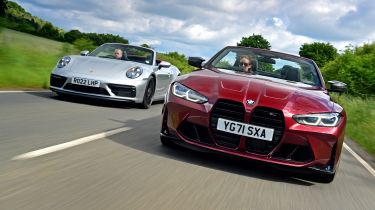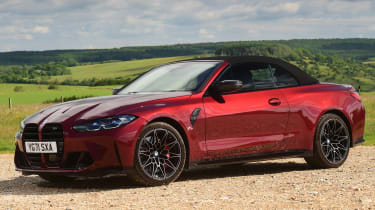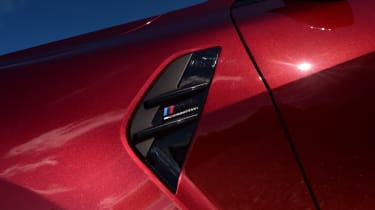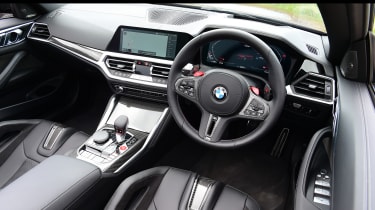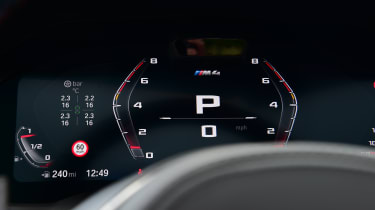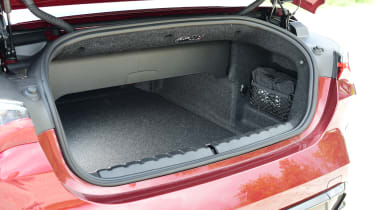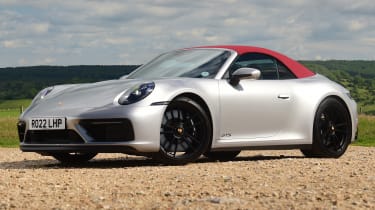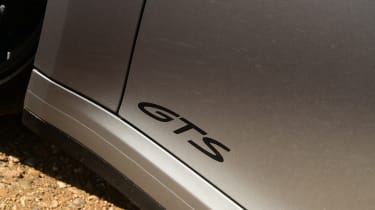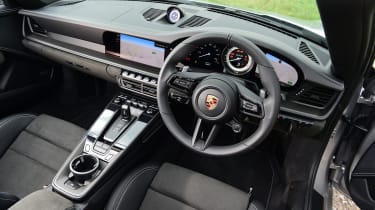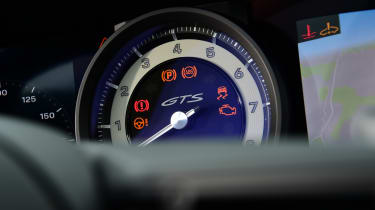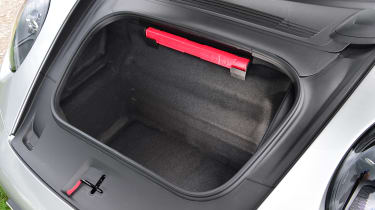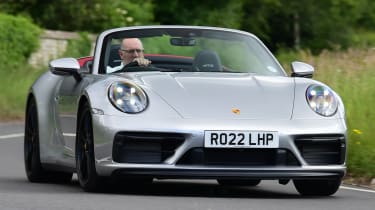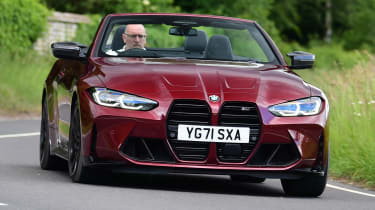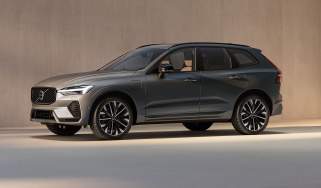BMW M4 Convertible vs Porsche 911 Cabriolet: 2022 twin test review
Latest BMW M4 Convertible takes on the evergreen Porsche 911 Cabrio for performance drop-top honours
Regardless of the size, performance or budget, lopping the roof off a vehicle makes driving fun; you get more fresh air, more sun – maybe too much, in recent days – and feel closer to the scenery breezing by.
But drop-tops carry compromises for the serious performance car driver. The reduction in structural integrity that goes hand in hand with removing a solid roof means that strengthening – and therefore more weight – needs to be applied elsewhere. Weight and wobbliness are two enemies of fast cars.
Yet the best engineers in the world try to mitigate both, and to see just how successful they can be, we’ve gathered together two of the fastest open-top sports cars around. The latest BMW M4 Coupé has proven to be both utterly thrilling to drive and incredibly quick, so how does this open-top model compare?
To find out, we’ve pitted it against the Porsche 911 Cabriolet. The model we have here is in GTS form that, full-on GT3 aside, is the finest driver’s car in the 911 range, at least in Coupé form.
BMW M4 Convertible
|
Model: |
BMW M4 Competition Convertible |
|
Price: |
£85,870 |
|
Engine: |
3.0-litre 6cyl twin-turbo, 503bhp |
|
0-62mph: |
3.7 seconds (with M Driver’s pack) |
|
Test economy: |
22.5mpg/4.9mpl |
|
CO2: |
233g/km |
|
Annual road tax: |
£520 |
The M4 Competition tested here comes with what BMW calls the Ultimate Pack. This £11,250 option adds a long list of extras, including laser headlights, a carbon-fibre exterior styling pack, carbon-fibre sports seats and a wind deflector.
Used - available now

2022 Kia
Sportage
28,301 milesManualDiesel1.6L
Cash £22,400
2021 Nissan
Leaf
13,199 milesAutomaticElectric
Cash £11,687
2023 Mercedes
EQC
55,632 milesAutomaticElectric
Cash £21,687
2021 Nissan
Leaf
17,471 milesAutomaticElectric
Cash £11,387Factor in the M Driver’s Pack (£2,095), which increases the limited top speed from 155mph to 180mph, plus the Aventurine Red paint (£1,100) and the model we’re driving costs £100,315.
Design & engineering
Under the skin, the BMW M4 Convertible has the same staggering technical stats as the regular Coupé version. A 3.0-litre, six-cylinder engine is boosted by a pair of turbochargers, which feature electronically controlled wastegates to boost responsiveness.
Two cooling systems – one for the intercooler, and one for the engine and turbos – keep things in check under hard driving, while the exhaust system features fully adjustable flaps that can alter the volume based on the driving mode. The result is 503bhp, 650Nm of torque and a 7,200rpm rev limit.
Unlike the M4 Coupé and mechanically similar M3 saloon, the Convertible is only available with xDrive four-wheel drive. While it’s a rear-biased system by default, it is possible to engage a rear-wheel-drive-only mode, but only if you disable the stability control set-up completely.
While losing the roof might traditionally bring some compromises to torsional stiffness, BMW hasn’t felt the need to do much to toughen up the underlying structure. The most notable addition is a package of extra torsion struts to the rear of the chassis. The Convertible also features the same additional bracing as the M4 Coupé over the standard 4 Series. This includes an aluminium panel to brace the front subframe against the reinforced sills, plus extra bracing further back.
While the M4’s predecessor had a retractable metal roof, the latest version has a folding canvas hood. The new system is 40 per cent lighter than before, and it can fully open or close within 18 seconds at speeds of up to 31mph.
Driving
On the move, there’s some evidence that BMW hasn’t taken too many steps to bolster the chassis. Across more challenging roads little shimmies can be felt through the structure when the roof is down. That feeling is more noticeable if you switch into one of the firmer M modes. Given that we find the Convertible’s ride much more forgiving in the standard setting, this isn’t too much of an issue.
The M4 remains a devastatingly quick point-to-point machine. Its engine is hugely effective, delivering a massive punch of acceleration at any revs and in any gear. While the Porsche’s flat-six motor offers a little more incentive to use all the revs, the speed on offer here is so impressive.
The BMW’s reserves of grip also feel incredibly high – even exceeding those of the Porsche – and the overall chassis balance is of a car that’s keen to point into turns, but without a hint of nervousness from the rear. The predominantly rear-driven balance lets you adjust the M4’s attitude through a corner with the reassurance that if and when the grip starts to falter, it does so very progressively.
Further increasing the feeling of agility is the steering; it’s very sharp, so the M4 feels far keener than its relatively high kerbweight would suggest. Much like in the Coupé, though, we’d prefer a little more feedback through the wheel. The same goes for the brakes, which are phenomenally powerful, but lack the feel of the 911’s set-up.
With the roof in place, the BMW is the more refined of the two. The canvas top is well insulated, to the point that it barely feels any louder than the M4 Coupé inside, making it an ideal long-distance companion. The Porsche is compromised by more pronounced road noise from its fat rear tyres.
Practicality
The M4 is the more practical car here, because its two back seats are genuinely usable. There’s plenty of space in the rear, even for adults, although it’s a little bit of a squeeze to get back there when the roof is up.
Boot space is excellent by both convertible and performance-car standards. At 385 litres, there’s room for a set of golf clubs or two suitcases, and the seats fold flat using some levers in the boot compartment itself. However, it’s worth noting that an open roof eats into that volume (but much less so than with the old M4’s metal folding roof), and it’s harder to load and remove items when it’s down.
Ownership
BMW provides a three-year, unlimited-mile warranty package with the M4. The Porsche comes with cover for the same duration, but with no mileage restriction. Although very few owners tend to average more than 20,000 miles per year in their 911, it still shows the confidence the brand has in its cars’ reliability. The same goes for the breakdown cover; Porsche offers a three-year deal to the BMW’s two years of cover.
Running costs
Fuel consumption won’t be a massive consideration with cars like these, but better economy does, of course, mean a greater distance between fill-ups. That’s a consideration when these are exactly the sort of vehicles that are ideal for continental cruises.
The Porsche was marginally the more frugal car; we managed 22.7mpg to the BMW’s 22.5mpg. Those figures included both enthusiastic and town driving, neither of which are great for fuel economy. The trip readouts showed comfortably more than 30mpg for both cars at steady motorway speeds. The M4 has a 59-litre tank to the Porsche’s 64 litres, which means respective ranges of 292 and 320 miles.
Tester’s notes: “The M4’s bucket seats give loads of support, but the lump in the middle of the seat squab, plus offset pedals, make it very hard to left-foot brake.”
Porsche 911 Cabriolet
|
Model: |
Porsche 911 Carrera GTS Cabriolet |
|
Price: |
£126,719 |
|
Engine: |
3.0-litre flat-six twin-turbo, 473bhp |
|
0-62mph: |
3.6 seconds |
|
Test economy: |
22.7mpg/5.0mpl |
|
CO2: |
248g/km |
|
Annual road tax: |
£520 |
There are variants further down the Porsche range that align more closely to the M4 on price, but the GTS is its nearest rival in terms of power and performance. It’s priced from £126,719.
Design & engineering
As one of the most driver-focused derivatives in the 911 line-up, it might be the model most at odds with the laid-back attitude that works with cabriolets so well. That hasn’t stopped the boffins at Stuttgart adding a little flair to the Carrera S package.
Subtle details on the outside include a satin-black lip spoiler at the front, plus tinted LED headlamps. The tail-lights are also in a finish that’s unique to the GTS. The satin-black wheels are staggered in size; the fronts measure 20 inches to 21 inches at the back.
Inside, there’s a suede-like microfibre material across the dash and on the seats. The driving position is fantastic; you sit lower than in the BMW, and the pedals are better aligned with the steering wheel. The build quality feels fantastic, and all of the key functions are ergonomically well placed.
Mechanically, the GTS features a host of upgrades, many of which are borrowed from the 911 Turbo. The braking system, with 408mm discs up front, and the suspension, which gets helper springs to increase control, are Turbo-derived, while the GTS sits 10mm lower than a Carrera S on the stiffened suspension. The adaptive dampers, roll bars and stability control systems are tuned specifically for the GTS.
The iconic rear-mounted flat-six engine produces 473bhp and 570Nm of torque. That’s 30bhp and 80Nm down on the BMW, but with the 911 weighing 1,615kg, its engine has considerably less mass to move around. The Porsche is available with rear and four-wheel drive, plus a manual or PDK automatic gearbox. The BMW is auto and four-wheel drive only.
Driving
If you’re keen for your circa-100 grand drop-top to be as much about low-speed posing as B-road blasts, then the BMW will be the better option. Below 20mph or so, the 911’s firm damping and limited suspension travel mean that a bump hitting one wheel will cause the whole body to move with it, resulting in quite a bouncy ride. As a driver, you can ignore this trait for the most part, but as a passenger it would start to get a little irritating.
Go quicker, however, and the firmness seems to evaporate. The 911 then begins to breathe with the road, shrugging off the worst undulations with superb body control, and a level of compliance that the M4 just can’t compete with. The result is that the Porsche feels more confidence-inspiring when you’re pushing, and a little more comfortable when you want to cover ground at a more relaxed rate.
Our car was fitted with rear-steering, a £1,592 extra. Unlike some systems of its type, it feels very natural and unobtrusive, adding an extra degree of agility in tighter turns while also endowing the 911 with even greater high-speed stability.
That iconic rear-engined layout has its own unique benefit, too, most notably traction. On a dry road and with warm Pirelli P Zero tyres (the BMW is on Michelin Pilot Sport 4S tyres), the rear grip is phenomenal. You’d need to be very determined or very clumsy to initiate any sign of slip on a public road. It contributes to a searing 0-62mph time of 3.6 seconds, 0.1 seconds less than the BMW, despite the Porsche’s 30bhp deficit and two fewer driven wheels.
The Porsche’s PDK auto gearbox is perfect. When you’re pushing, it responds instantaneously, yet still shifts more smoothly than the BMW’s eight-speed torque converter. At low speeds, its behaviour is immaculate, too; it’s genuinely happier to reverse- park than many auto-equipped superminis, all the more amazing when it’s dealing with a car capable of 192mph. At any speed, the engine is fantastic. It’s strong and keen at the low end, yet offers huge rewards when making the most of every rev.
Practicality
Of all the options on the 911’s lengthy list, we’d recommend the Front Axle Lift System above all others. For £1,709, it adds a hydraulic system that raises the front by 40mm at speeds up to about 22mph. It turns a car which will make you wince at the thought of speed bumps into something that can be used like any other vehicle.
That is, any other car without any back seats. The seats here are comically small, to the point where we’d question if they can be even called seats at all. You can fold the backrests down to give a level shelf behind the front seats, which translates into 163 litres of storage space. Combined with an extra 132 litres up front, overall storage is reasonable, if not quite as generous as the BMW’s.
Ownership
Porsche has proven to be a very easy brand to live with. In our Driver Power 2022 satisfaction results, the company took first place in the manufacturer’s rankings for the second year running.
The German brand also took top spot in our 2021 dealer survey, but didn’t appear this year. In contrast, BMW took 16th as a manufacturer and 15th for its dealers in our 2022 poll, just below average overall.
Running costs
It’s pretty clear from the figures that the Porsche 911 is the more expensive car in this test, but it’s also worth bearing in mind that it will also hold on to much more of its value if the time ever comes when you decide to sell.
The M4 Competition Convertible is predicted to retain 46.6 per cent of its original value after three years, at which point it’ll be worth just over 40 grand of its original £86,000 list price.
In contrast, if you put £125,000 or so down on a 911, it’ll be worth nearly £77,000 three years down the line, which is 60.5 per cent of its original value.
Tester’s notes: “If you want to make the most of the 911’s storage space, then Porsche offers a four-piece leather luggage set that’s yours for £4,110.”
Verdict
First place: Porsche 911 Cabriolet
While both remain utterly compelling performance cars even without a roof, the 911 is the marginally less compromised of the two models. Only the keenest driver will notice any difference between this and the Coupé version; next to the BMW, it’s more exciting to drive, and less windy with the roof down. Most of all, though, it just feels more special, which is what cars like these are all about.
Second place: BMW M4 Convertible
For some people, the M4 will get the nod over the Porsche for one clear reason: practicality. Usable back seats will be a deal-breaker for some, and the boot is larger, too. Desirable though it is, as an overall package the M4 still drops just behind the Porsche. As a driver’s car, its body control lacks the 911’s sophistication, while from a financial point of view, it’ll depreciate faster.
Other options for similar money
New: Lexus LC 500 Convertible
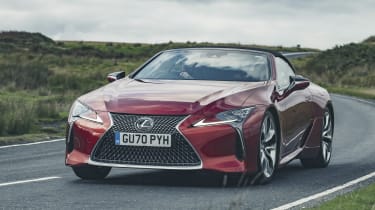
- Price: £99,845
- Engine: 5.0-litre V8, 464bhp
It might focus more on luxury than driver appeal, but chopping the roof from the Lexus LC 500 makes it all the better for appreciating that wonderful 5.0-litre naturally aspirated V8. The sound alone is worth the £100,000 asking price.
Used: Audi R8 Spyder
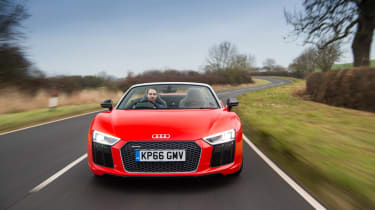
- Price: £100,000 (2017, 17k miles)
- Engine: 5.0-litre V10, 533bhp
If you’re willing to do without back seats, then why not go the whole hog and get an open-top supercar? The R8 is very easy to drive at low speeds, while its glorious V10 engine ranks among the all-time greats.
Figures
|
Porsche 911 Carrera GTS Cabriolet |
BMW M4 Competition Convertible | |
|
On the road price/total as tested |
£126,719/£138,074 |
£85,870/£100,315 |
|
Residual value (after 3yrs/36,000) |
£76,614/60.5% |
£40,024/46.6% |
|
Depreciation |
£50,105 |
£45,846 |
|
Annual tax liability std/higher rate |
£9,235/£18,470 |
£6,201/£2,402 |
|
Annual fuel cost (12k/20k miles) |
£4,561/£7,602 |
£4,602/£7,670 |
|
Insurance group/quote/VED |
50/£1,371/£520 |
50/£804/£520 |
|
Cost of 1st/2nd/3rd service |
N/A |
£1,620 (3 years) |
|
Length/wheelbase |
4,533/2,450mm |
4,794/2,851mm |
|
Height/width |
1,302/1,852mm |
1,395/1,887mm |
|
Engine |
Straight-six/2,981cc |
6cyl inline/2,993cc |
|
Peak power/revs |
473/6,500bhp/rpm |
503/6,250bhp/rpm |
|
Peak torque/revs |
570/2,300Nm/rpm |
650/2,750Nm/rpm |
|
Transmission |
8-speed auto/rwd |
8-speed auto/4wd |
|
Fuel tank capacity/spare wheel |
64 litres/repair kit |
59 litres/repair kit |
|
Boot capacity (front/rear) |
132/163 litres |
N/A/385 litres |
|
Kerbweight |
1,615kg |
1,995kg |
|
Turning circle |
10.7 metres |
12.2 metres |
|
Basic warranty (miles)/recovery |
3 yrs (unlimited)/3 yrs |
3 yrs (unlimited)/2 yrs |
|
Driver Power manufacturer/dealer pos. |
1st/1st* |
16th/15th |
|
NCAP: Adult/child/ped./assist/stars |
N/A |
97/83/93/72/5*** |
|
0-62mph/top speed |
3.6 secs/192mph |
3.7 secs/180mph^ |
|
Auto Express economy (mpg/mpl) |
22.7/5.0 |
22.5/4.9 |
|
Auto Express range |
320 miles |
292 miles |
|
WLTP combined |
25.9mpg |
27.7mpg |
|
WLTP combined |
5.7mpl |
6.1mpl |
|
Actual/claimed CO2/tax bracket |
287/248g/km/37% |
290/233g/km/37% |
|
Airbags/Isofix/parking sensors/cam. |
Yes/yes/f&r/yes |
Yes/yes/f&r/yes |
|
Manual box/lane-keep/blind spot/AEB |
£0/£749/£581/yes |
No/yes/yes/yes |
|
Climate control/cruise control |
Yes/yes |
Yes/yes |
|
Leather/heated seats |
Part**/yes |
Yes/yes |
|
Metallic paint/LED lights |
£876/yes |
£0/yes |
|
Keyless entry & go/powered tailgate |
Yes/no |
£990^^/no |
|
Satellite navigation/digital dashboard |
Yes/no |
Yes/yes |
|
DAB/connected services |
Yes/yes |
Yes/yes |
|
Wireless charging |
No |
Yes |
|
Apple CarPlay/Android Auto |
Yes/yes |
Yes/yes |
